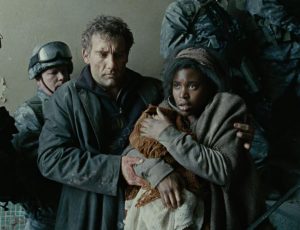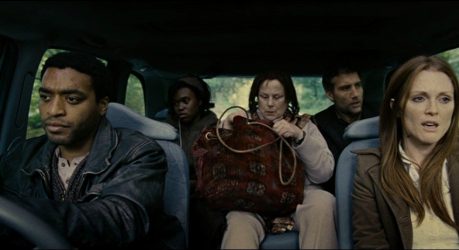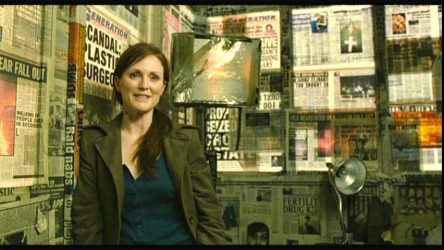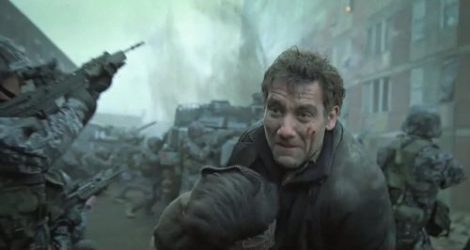
Children of Men (2006) Cuaron’s Children of Men is one of the few post-apocalyptic nightmares I can believe in. Its dystopian vision of a future world not so far away (its events are set in 2027) rings true from start to finish, and its unrelenting bleakness never reeks of hyperbolic fantasy. This is not a streamlined world of impossible gadgetry or robotic intrusion (whereby the machines have overthrown their masters), but a picture that takes very small flights of the imagination, using contemporary hostilities and fears (terrorism and environmental destruction) to project forward into a likely scenario that shocks out of stunned recognition. As we enter the film, all of humanity is sterile, and due to several catastrophic events a flu pandemic and obvious nuclear warfare in several countries lawlessness and chaos have swiftly dispatched such trifles as order and democracy.
The world entire has largely been reduced to rubble, and as a promotional video proclaims, Britain stands alone as the last bastion of hope for a shattered planet. One might wonder why the once-great empire insists in being the lone remaining superpower (a great fantasy indeed, to have outlasted the upstart United States), but more than a product of vanity, it is simply a coincidence, as the England of this project cannot exactly say that it is pushing its people into a bold new future.

The central story is that of Theodore Faron (Clive Owen) and his quest to sprint young Kee (Claire-Hope Ashitey) to the safety of the Human Project, a near-mythical haven that, according to rumors and gossip, is the last, best hope for mankind. It is the resistance made flesh, and its members are said to offer safety and protection for the marginalized and the damned of a dying nation. Kee’s arrival is of the utmost importance because, shockingly to all, she is pregnant, an impossibility in this new world, but nonetheless a fact. That she is black and a non-citizen of Britain is crucial, because the England of the future has instituted a brutal, uncompromising campaign of internment for all those not of true British stock.
These people are labeled undesirable, cast out as refugees, and sent to camps across the countryside; that is, when they aren’t being tortured and humiliated in detention centers that are unmistakable stand-ins for Abu Gahrib. In the name of security, all of England has become an armed camp; a smoking cauldron of government oppression and violent retribution. As expected, opposition forces (primarily the Fishes and their leader, Julian, played by Julianne Moore) have secured themselves throughout the country, and their primary goal is to establish equal rights for all, thereby eliminating distinctions between legal and illegal classifications. Again, any applicability to the current political debate is strictly unintentional. Uh-huh.

We learn a bit about Theodore he once had a child, but it died during the flu outbreak, and a long time ago, he was a passionate social activist but it is to the films credit that we don’t become too familiar. In fact, nearly everyone in this movie is a mere sketch; a full, interesting character, yes, but lacking the sort of identity that is usually established with long speeches or flashbacks of some kind. Given that the world has been brought to the brink of ruin, it is best that we share as best we can the utter hopelessness and desperation of the characters. They are reduced to pure survival and constant paranoia (this is a delivery, after all, and everyone must keep moving), and its enough that they go about their business.
The circumstances of their lives are well-known to these people, and were they to sit by a campfire and explain it all, or remember with fondness times gone by, the emotional momentum of the film would be lost. Yes, Children of Men is an allegory, or a cautionary tale, or a grim warning, but it blissfully avoids becoming heavy-handed, while lesser films might have treated us like confused students. Having each character in turn stand before us and give us biographical sketches would have stopped the piece cold, instead of feeling as if we stumbled upon a hidden video record of a unique time and place.
The resistance to easy answers is also expressed by the ambiguities of plot. Sure, we see a few headlines and a few casual remarks about past events, but we don’t really know why the world has reached this state, nor do we ever find out why humanity has suddenly lost the ability to reproduce. We can hazard a few guesses, but nothing is definitive, which has the added bonus of making the vision even more horrific: were doomed, friend, but you’ll have no one to blame. Still, we see immediately that a world without children, as utopian as that sounds to me here, safely in my world only starting to unravel, would in fact trigger a frantic meltdown, as one of the few things that keeps people in check is the desire to see a better world for their kids.
Needless to say, having a family is by no means a sure-fire method of eliminating crime or instilling a moral code, but there does seem to be a great deal of truth to the notion that an individuals sense of self-worth stems from ensuring a legacy. I can be quite content to loathe the little shits and place no value on passing on my own DNA, but even I concede that at bottom, doing exactly that is the only real why of existence. Everything else is arbitrary and artificial; distractions with which to build our lives when we aren’t procreating. Thankfully, the human brain has evolved in such a way to allow for more than a slavish adherence to biology, but absent the rules and regulations of civilization such as the total breakdown portrayed in the movie we become mere animals once again; lost savages without meaning or purpose, filling our days with only the bare essentials. Without a future to build for, the complexity of the human mind becomes utterly and inescapably valueless.
So yes, while Cuaron’s vision is somber, cruel, and stark, it uses the goal of transfer as a springboard for some exciting set pieces and masterfully staged action scenes. And yet, nothing is so silly as to appear choreographed and cleaned up for consumption. The camerawork is jumbled and punishing in its dispassionate observance, refusing to turn away from the blood, grime, and filth of our own creation. And when called for, the camera rides along unencumbered, as with a few unbroken shots that set new standards for technical mastery. It’s an exhausting experience to be sure, if only because we sense how little time is left. But what of this Human Project? Can we be certain that the baby will not be taken from its mother, who herself is to be gutted like a fish in the research lab? Or will Kee be held against her will and bred like a horse, reducing her hellish existence to a series of unwanted violations?

One can imagine that, as in Margaret Atwood’s The Handmaids Tale, Kee would become the official vagina of all Christendom, used and abused by the top brass and key officials of the British government. Kee’s pregnancy also proves that there is at least one male left alive who remains potent, but where could he be at this late date? And given that there were so many men who had a crack at her (by her own admission), choosing a single face from the lot would be sheer folly. As such, the film wisely avoids his identity, making Kee not a saintly figure of angelic destiny, but an unrepentant whore.
Sure, Theodore’s journey with Kee in tow is eerily similar to the Biblical tale of Joseph, Mary, and the Baby Jesus, but any religious connection is more hoped for (not by me, though) than realized. Even the movies conclusion, a far too optimistic turn despite being a bit ambiguous, implies a rescue that taps Kee and her child as humanity’s salvation. Will this baby girl, dubbed Bazooka by her mother, redeem mankind for its grievous sins? Such an interpretation isn’t laughable, so maybe my resistance to it is nothing more than an atheists refusal to cede quality cinema to the religious maniacs. Had the film ended appropriately, however one more consistent with the films overall nihilistic tone and pulled back from Kee’s boat with no sign of the waiting ship, I would have been far happier with the result.
Even if a spirituality was insisted upon, I could argue that the gods eye view was simply an indifferent deity finally putting to rest a creation he long regretted ever breathing to life. But as soon as the rescue craft appears from the fog, it is a given that a rebuilding is to occur. Sure, the baby could die, Kee’s pregnancy could have been a fluke, and even Kee herself could expire before another go, but I have every confidence that Cuaron is suggesting a way out of the madness. Humanity may have so wrecked its habitat that our extinction loomed on the horizon, but once instinct was forced to regain the controls one last time, possibilities flowered.
In addition to the refreshing turn away from the usual sci-fi indulgences, the movie slyly works in a few jabs at current crises that will no doubt continue to haunt us a mere twenty years hence. Britain has developed a product called Quietus, for example, a suicide-in-a-box that is marketed as the ultimate in personal choice. The world need not reach this grave state for such a device to become popular, though, as the graying of America is bound to tax our resources so heavily that what is now deemed a positive, even endearing aspect of the modern world living far beyond the life expectancy will soon become a burden beyond control.

I wouldn’t even be surprised if nursing homes suddenly witnessed an abnormally high rate of carbon monoxide accidents in the coming years. Somethings got to give, and Social Security checks will be the least of our concerns. Hilariously, as Theodore’s old buddy Jasper (Michael Caine) notes, the same country that promotes a pill that intentionally kills people outright, still bans the ganja. We laugh at Jasper’s observance because it strikes us as all-too-feasible that in the midst of civilizations last stand, the government would still insist on fighting the drug war.
Its also strikingly close to home to have a nation reduced to identity checks and a state of armed readiness, as anyone sane realizes that if the United States is hit with another significant terrorist attack, the country’s turn will, like the prescient Mrs. Iselin said in The Manchurian Candidate, make martial law seem like anarchy. Expect checkpoints, travel restrictions, a renewed hostility to foreigners and immigrants, and the suspension, if not outright dismissal, of the lone document that ensures our liberty. Its not overstating the case to expect that the militarization of America would, at the very least, be attempted, and depending on the overall body count or interruption of daily life, its complete adoption might meet with little resistance.
The Iraq debacle may have changed this slightly (we are, at least I hope, more skeptical about the governments role in this area), but I don’t find Cuaron’s assessment to be wildly off the mark. At any given point, we are but one major disaster away from a full retreat into darkness. How far we go, and how long we stay, are the only unknown variables. Children of Men is more extreme than even a major terrorist event, after all, but it is significant and not at all accidental that the slide into oblivion begins in 2008. Were Cuaron wanting to be less cautionary and political and more, say, futuristic, he would have shot forward a few hundred years at least, where we could wipe our brows with relief. But this is just around the corner. This is right fucking now.